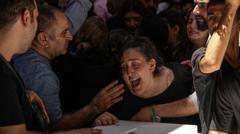Is the Future of Syria's Christians in Jeopardy After the Church Attack?

Understanding the Religious Tensions and Violence in Syria
The recent suicide attack on the Greek Orthodox Church of the Prophet Elias in Damascus stands as a stark reminder of the ongoing religious tensions and violence that have gripped Syria for over a decade. With the loss of lives, including that of Milad, who heroically attempted to thwart the attack, the incident has ignited fears among the Christian community, which has already faced significant challenges in the wake of the Syrian civil war. This article delves into the broader implications of such violence, the fate of religious minorities in Syria, and the socio-political landscape that has led to this tragic event.
The Context of the Syrian Civil War
The civil war in Syria, which began in 2011, has resulted in catastrophic humanitarian crises and a severe demographic shift. Before the war, Christians constituted about 10% of Syria’s population, numbering approximately 2.2 million individuals. However, since then, hundreds of thousands have fled the country due to violence, persecution, and the rise of extremist groups, leading to a drastic decline in their numbers.
During the rule of Bashar al-Assad, many religious and ethnic minorities believed they were protected by the state. This belief was rooted in the secular nature of the Assad regime, which sought to maintain a delicate balance among the various sects and communities within Syria. However, following the overthrow of Assad in December, the rise of Islamist-led factions has left minorities feeling vulnerable and exposed to threats.
The Attack on the Greek Orthodox Church
On June 22, the tragic bombing at the Church of the Prophet Elias marked a turning point. The attack, which resulted in the deaths of 25 individuals, including Milad, and injured over 60 more, was not just an isolated incident but part of a larger pattern of violence targeting religious minorities.
Witnesses describe the horror of the event: gunshots followed by an explosion that shattered lives and instilled fear in the hearts of the congregation. Emad, Milad's brother, encapsulated the grief and chaos when he recounted the moment he learned of the attack and the difficulty in recognizing his brother’s body due to the injuries he sustained.
The Broader Implications for Christians in Syria
The church attack raises significant questions about the future of the Christian community in Syria. With many Christians expressing fears for their safety, the sentiment of insecurity is pervasive. Angie Awabde, a young woman who was injured in the attack, articulated a feeling of helplessness and desperation, stating that if the government can't protect them, they wish to leave the country.
The Role of Extremist Groups
The Syrian authorities have attributed the attack to the Islamic State (IS) group, although a lesser-known Sunni extremist group, Saraya Ansar al-Sunnah, has claimed responsibility. This ambiguity highlights the ongoing complexities surrounding extremist factions operating within Syria and their impact on the fragile security situation.
For many, these groups represent not just a physical threat but also a fundamental challenge to the societal fabric of Syria. The fear is that with the rise of such factions, the security and rights of religious minorities will continue to diminish, further exacerbating the already dire humanitarian crisis.
Government Response and Public Sentiment
In the wake of the church attack, Syrian President Ahmed al-Sharaa has promised justice for the victims, suggesting that those responsible will face consequences. However, many within the Christian community remain skeptical of the government's ability to ensure their safety. The Patriarch of the Greek Orthodox Church, John Yazigi, underscored this sentiment during a sermon, emphasizing that a mere phone call from the president could not suffice in the face of such grave violence.
Security Measures and Public Protests
Following the bombing, there was a visible increase in security measures, with a heavy police presence during memorial services for the victims. Yet, these actions have done little to alleviate the pervasive fears among the population. Residents are concerned that the government’s response is reactionary rather than proactive, leaving them vulnerable to future attacks.
Societal Changes and Cultural Backlash
In addition to the direct threats posed by extremist groups, there are growing concerns regarding cultural shifts in Syrian society. Reports of a crackdown on social freedoms, such as restrictions on women’s dress codes and the public display of alcohol, indicate a broader trend towards conservatism that many interpret as a precursor to an Islamist agenda. These changes raise alarms about the potential for increased sectarianism and discrimination against non-Muslim communities.
Community and Religious Leaders' Perspectives
Religious leaders, like Archimandrite Meletius Shattahi from the Greek Orthodox Patriarchate, have voiced concerns over the government's inaction in addressing the rise of extremist ideologies. He points to videos of armed preachers advocating for Islam in predominantly Christian neighborhoods as evidence of a growing threat that is not being adequately addressed.
This lack of action is perceived as tacit approval of such behavior, which only serves to heighten fears among the Christian community and other minorities. As the government grapples with its legitimacy and authority, the stakes for these vulnerable groups remain alarmingly high.
The Future of Religious Minorities in Syria
As the dust settles from the church attack, the future of religious minorities in Syria hangs in the balance. While the government has made promises of protection, the tangible security and societal acceptance of Christians and other minority groups remain questionable.
The international community must pay attention to these developments, as the protection of religious freedoms and the safeguarding of minority communities are not only moral imperatives but also essential for the stability and peace within Syria.
Conclusion: A Call for Awareness and Action
The tragic events surrounding the church attack in Damascus serve as a wake-up call for both the Syrian government and the global community. The necessity for a comprehensive approach to protect religious minorities, promote tolerance, and ensure safety is imperative. As Emad and Angie’s stories illustrate, the stakes are not just political; they are profoundly personal and human.
In a country still reeling from the aftereffects of civil war, the voices of the marginalized must not be silenced. It is crucial to advocate for policies that promote inclusivity and safety for all citizens, regardless of their religious affiliations. The road ahead will be fraught with challenges, but the resilience and courage displayed by individuals like Milad, Emad, and Angie remind us of the inherent value of every human life in the quest for peace and security.
FAQs
What sparked the recent violence against Christians in Syria?
The violence stems from a complex mix of factors including the rise of extremist groups following the civil war, societal changes, and a perceived decline in government protection for minority communities.
How has the civil war affected the Christian population in Syria?
The civil war has led to a significant decline in the Christian population in Syria, with hundreds of thousands fleeing the country due to violence and persecution.
What measures can be taken to improve safety for religious minorities in Syria?
A multi-faceted approach is needed, including stronger government protection, community engagement, and international advocacy for religious freedoms.
The ongoing situation in Syria raises difficult questions about the future of its diverse communities. As the nation grapples with its identity and the implications of its civil war, one must ask: How can we ensure a peaceful coexistence for all religions in Syria? #Syria #ReligiousFreedom #PeaceInSyria
Published: 2025-06-30 18:25:14 | Category: technology



